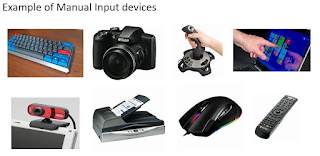What is a computer? A computer is an electronic device, operating under the control of instructions stored in its own memory that can accept data (input), process the data according to specified rules, produce information (output), and store the information for future use.
Functionalities of a computer
- Takes data as input
- Stores the data.
- Processes the data and converts it into useful
information.
- Generates the output & Controls all the above four steps
Computer components
q Any kind of computers consists of HARDWARE AND SOFTWARE
Hardware:
q Computer equipment that you can touch and handle is called
Hardware. This is the name given to all the physical devices that make up the
computer system.
Software: is a set of computer programs and
associated documentation and data.
- System
Software
- Application
Software
Input Device
Central Processing Unit (CPU)
A CPU is brain of a computer. It is responsible for all functions and processes.
- Arithmetic
Logic Unit (ALU): Executes all arithmetic and logical operations.
Arithmetic calculations like as addition, subtraction, multiplication and
division. Logical operation like compare numbers, letters, or special
characters.
- Control
Unit (CU): controls and co-ordinates computer components.
- Registers:
Stores the data that is to be executed next, "very fast storage
area".
Storage Devices
Primary Memory: -
- RAM:
Random Access Memory (RAM) is a memory scheme within the computer system
responsible for storing data on a temporary basis.
- ROM (Read Only Memory): ROM is a permanent form of storage. ROM stays active regardless of whether power supply to it is turned on or off. ROM devices do not allow data stored on them to be modified.
Secondary Memory: -













0 Comments